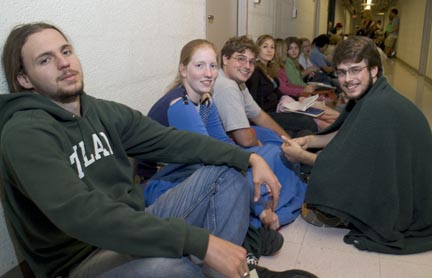More than 200 displaced Tulane students arrive on campus
By Lauren Gold

For Tulane University students, classes were supposed to begin Aug. 31. Instead, many began classes at Cornell Sept. 6, after Hurricane Katrina devastated New Orleans and the surrounding area and Cornell extended an offer to open its doors to Tulane students and faculty affected by the storm's damage and widespread flooding.
Tulane sophomores Randy Kitchen, Caroline Hiatt, and Steve Stumpf arrived in Ithaca at 3 a.m. Sept. 6. By 7:30, they were joined in the hallway outside the School of Continuing Education and Summer Sessions' Day Hall office by more than 200 of their classmates, more than 2,000 miles away from the campus, dorms and apartments they had already moved into.
The students wore T-shirts and shorts and flip-flops in the early morning chill. Some wrapped themselves in blankets or green-and-white Tulane sweatshirts.
Kaitlin Willham '07 spent Labor Day traveling on a bus between Corpus Christi, Texas, and Ithaca, arriving at 2 a.m. on Tuesday with a single bag. The rest of her things are stuck in her dorm room at Tulane.
The chemistry major considered several schools that extended offers similar to Cornell's -- but said ultimately the decision was easy. "I just chose this school because it looked so welcoming," she said. "But it's awfully cold here."
Tulane sophomore Cooper Wilson was less worried about the temperature. "I have two T-shirts and flip-flops," he said. "That's it." Still, the premed student from Mobile, Ala., is looking forward to winter. "I've never seen snow," he said. "I can't wait to make snowballs."
Like nearly all his classmates, he didn't know where he would be sleeping Tuesday night. But Glenn Altschuler, dean of the School of Continuing Education and Summer Sessions, said the university had identified more than enough housing for the displaced students.
"I don't think the Tulane students knew how truly blessed they are," said Kolleen Verlander of Lafayette, La. She nodded at her son, Greg, a biomolecular engineering major at Tulane. "It's like that old adage: 'You don't know what you have until it's gone.'"
Michael Woodman, a freshman from North Carolina, was more optimistic. "I left all my stuff down there, but I think it's fine," he said. "I called Cornell on sort of a whim," he added. "They said just show up on Tuesday, which I almost didn't believe, it was so easy."
Easy on him, anyway. "It's harder on my parents," he added. "They've had to leave me behind twice now."
As of Tuesday afternoon, Cornell IDs had been issued to more than 150 students.
"We had no idea what the response was going to be," said Cathy Pace, registrar for Cornell's School of Continuing Education and Summer Sessions, which is handling the admissions process. "It could have been one student or a couple hundred; we just had no idea.
"For what these students have been through, their attitudes and enthusiasm about coming to Cornell have been outstanding. We're so pleased to be able to help during such a difficult time for these people," Pace said.
Cornell President Hunter R. Rawlings first announced Sept. 1 that the university would open its doors to Tulane students and faculty. "The entire Cornell community recognizes the terrible plight of our colleagues at Tulane University," said Rawlings. "We want to do everything we can to help them in their time of need."
Calls from Tulane students and parents began coming in that evening and continued throughout the weekend.
The offer extended to Tulane students and faculty was just one of the many ways the university and the Cornell community has been reaching out to provide aid and relief to those affected by Hurricane Katrina -- from fund-raising efforts on Ho Plaza, counseling, referrals and other support offered to the 700 Cornell students who have family in the hardest-hit areas to the arrangements made to take in displaced Tulane students and faculty.
At a meeting in Statler Hall Sept. 1, representatives from departments across campus met with students from Louisiana, Florida, Mississippi and surrounding states to discuss Cornell's response to the hurricane. "We know this is on the early side of the response," said Laura Lewis, a volunteer crisis manager for the Office of the Dean of Students. "We think of ourselves as in this with you. This is going to be a long-haul ordeal. Our thoughts are with you."
Relief efforts across campus are well under way. Students from fraternities, sororities and campus organizations started collecting donations for the American Red Cross on Ho Plaza last week; those efforts will continue at least until Sept. 21. Volunteers in the Law School will be collecting Red Cross donations in Myron Taylor Hall between 10 a.m. and 3 p.m. through Friday, Sept. 9. Other students interested in helping are urged to contact the American Red Cross or the Office of the Dean of Students.
At Weill Cornell Medical College, physicians have registered with the American Red Cross to send supplies or serve as volunteer relief workers along the Gulf Coast. "We're in a watch-and-wait situation," said public affairs coordinator Sean Kelliher.
Media Contact
Get Cornell news delivered right to your inbox.
Subscribe